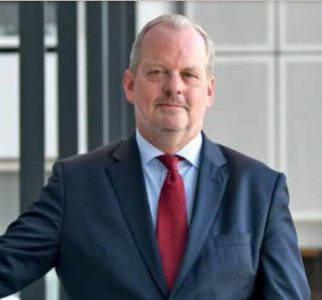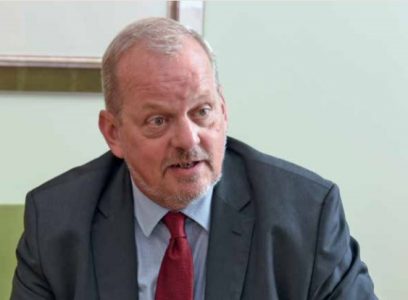
H.E. Mr Henk van den Dool will end his term as the Dutch Ambassador to Serbia, after spending four years in our country. In his farewell interview, he talks about what he loves in Serbia, what are the similarities and what differences between our countries, and how can the current relations between the two countries improve.
You are finishing your term as the Dutch Ambassador this summer. How do you feel about these four years you spent in Serbia?
— These have been four truly fascinating years, in which I have come to know a country with an incredibly rich history, which I, as a historian, appreciate tremendously. But it is also a country with a bright future. One which is based on the natural wealth of the country, but especially its people who are young, well-educated, enthusiastic and entrepreneurial. It is very important that people see that future and make the conscious decision to invest in it and stay. I will personally miss this country, and particularly its people, dearly. I will definitely be coming back to visit often in a private capacity.
What were the most difficult tasks for you during your term in Serbia?
— When I started I was more optimistic about the tempo in which the necessary reforms on Serbia’s path to the EU could be implemented. I now have a more realistic perspective on that, for better or worse. For someone who, like me, is not very patient, it is difficult to have to accept that the challenges and difficulties are tougher than you’d like them to be. At the same time, it goes without saying that I, with admiration and satisfaction, see that Serbia is in a significantly better shape today than it was four years ago, particularly in terms of its economy.
What is your view of the current economic and diplomatic relations between our two countries?
— Honestly, I can only say that they are excellent. The Netherlands is one of the biggest foreign investors in Serbia, which shows that Dutch businesses recognize Serbia’s enormous potential. It also makes it easier for me to address concerns, for instance about the rule of law, as Dutch investments show that it pays off to undertake reforms: improvements in the investment climate are rewarded. Diplomatically, relations are closer than ever simply because Serbia is working hard to become a member of the European Union, of which the Netherlands is one of the ’founding fathers’. This means our strategic orientations are aligned and we share a common goal. What also makes the work of a diplomat easier is that Serbians, like the Dutch, are straightforward and honest so we can have open and frank discussions, as friends do.
What are the most important tasks for the Serbian authorities when it comes to continuing the road towards EU membership in the next few months?
— I welcome the commitment of the Serbian authorities to the European future and the efforts that they have made on the road to the EU. In my view, in the next few months and beyond two issues are essential. The first is to keep displaying the political will to move things in the right direction. The EU integration process can transform the Serbian economy and society, but only if the technical procedures are rooted in strong political commitment. Without this, difficult reforms are impossible, especially when vested interests are at stake. The second task is related and has to do with communication. EU accession rests on popular support and the belief that the EU can make a difference in the everyday lives of Serbian citizens. This is the case in EU member states as much as in candidate countries. We have a joint responsibility: for companies to explain how the internal market facilitates business, for students to share their experiences at universities in other European countries, for NGOs to advocate fundamental European values such as the freedom of expression, and for politicians to explain why EU membership is in the best interest of Serbian citizens.
How much is life in Serbia different to life in the Netherlands?
— Life in the Netherlands is much more tightly organized and business-like. Professionally, that can be a positive thing as it makes things more predictable and more easy to prepare for. But in the Netherlands, it’s also very common to have to plan meetings with friends and family far in advance. I will need to get used to that again. I find a personal touch in my professional life (the Serbian way) to be much more pleasant than a professional touch in my personal life (the Dutch way).
What is the difference in the business culture? Was there anything that was a big surprise to you?
— The cliche now commands to say something about the long, late and heavy lunches in Serbia. Of course, that is a staple of Serbian life, particularly in diplomacy and business, and sometimes I find them to be a bit too much. But at the same time, I think we, the Dutch could learn a lot from there. Being more flexible and creating more space to be together, talk and enjoy the finer things in life never hurt anybody! In general, I think that the differences are not as big as they often made out to be. In my experience, the Serbian and Dutch people get along excellently. We share a certain directness and have a similar sense of humour. I personally particularly find the latter very important. Dutch companies employ over 15,000 people in Serbia. They are active in a large number of sectors, from shipbuilding to IT, sales, farming, beer industry and design. Where do you see room for improvement? — There is room for improvement in all of the above! And not because it’s going badly, but because it’s going so well. I think that the Netherlands, i.e. the Dutch companies, have a great deal to offer Serbia. In fact, I know that to be the case because of what you just set out yourself. The diversity of sectors in which Dutch companies are not just present, but often times leading in terms of success, innovation, CSR and technology shows that.

The companies that are already present here are doing well, and many of them are working on expanding, while an increasing amount of companies from the Netherlands are knocking on our door because they’ve heard about the potential in Serbia and would like to know more about the opportunities. And this happens across the board in terms of both sectors and sizes of companies. We, the Dutch, are generally quite modest and don’t like to make a big deal out of things, particularly when it comes to business, so many people in Serbia may not know that they shop daily in a Dutch supermarket chain, drink Dutch beer, have Dutch lightbulbs and use Dutch consumer products. So perhaps there lies the real room for improvement. One of your roles as the Ambassador of the Netherlands to Serbia is, among other things, bolstering the bilateral relations between our two countries, both on a political and economic level.
How many Dutch companies that have already positioned themselves in our market are helping with achieving this mission?
— My role as the Ambassador to Serbia is indeed to strengthen the bilateral relations between our two countries. I and my team at the Embassy do this in many ways. Cultural exchange, bilateral support for crucial reforms, support to Serbia’s EU Integration trajectory…. However, I always say that there is one key aspect of our bilateral relationship in which I am particularly proud to have the help and support of a much wider team, aside from my own. In which I have the support of a team of Dutch companies, investors and entrepreneurs that bring with them our traditions, innovative technologies, our ways of doing things. Advanced practices in social responsibility, labour safety standards, employment and many other things. A team of Dutch companies that exchange experiences, knowledge, goods and services with Serbia on a daily basis. So each of those companies is an Ambassador in their own way, and they make me very proud.